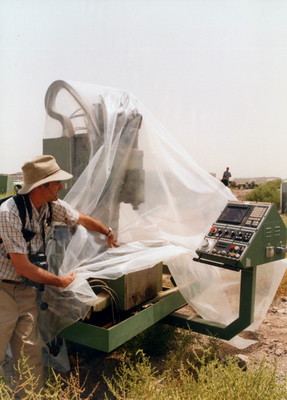
An IAEA Action Team inspector uncovers a CNC machine tool, a piece of technology used to manufacture centrifuge components.
(Source:
Action Team 1991-1998 / IAEA)
A State is considered non-compliant if, at any
time, it is in violation of its safeguards agreements with the
IAEA. Examples of this include:
- Under a comprehensive safeguards agreement, the diversion of
nuclear material from declared nuclear activities, or the failure
to declare nuclear material required to be placed under
safeguards
- Under a comprehensive safeguards agreement, the diversion of
the nuclear material or the misuse of the non-nuclear material,
services, equipment, facilities, or information specified and
placed under safeguards
- Under an additional protocol based agreement, the failure to
declare nuclear material, nuclear activities, or nuclear related
activities required to be declared under Article 2
- Under all types of agreement, violation of the agreed recording
and reporting system, obstruction of the activities of IAEA
inspectors, interference with the operation of safeguards
equipment, or prevention of the IAEA from carrying out its
verification activities.
Instances of non-compliance are reported to the IAEA Board of
Governors, which informs the UN Security Council and General
Assembly.